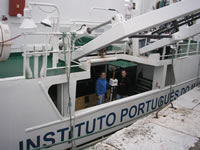IPMA supports the launching of Argo float
 2013-04-01 (IPMA)
2013-04-01 (IPMA)
An Argo float was released yesterday (27-03-2013) onboard IPMA's RV Norway IPMA (photos below). This activity took place within the Euro-Argo RI program (http://www.euro-argo.eu/), as part of collaboration between the Oceanography Center of the Faculty of Sciences of the University of Lisbon and the Marine Institute of Ireland.
The Argo global network consists of a permanent set of at least 3,000 autonomous instruments drifting over the world's oceans. Typically, each float Argo is programmed to drifting with ocean currents at a depth of 1000-2000 m for about 9 days, and then adjust its buoyancy to rise to the surface, while measuring and recording the temperature and salinity of the sea from the 2000 m to the sea surface. When it arrives to the surface, it remains there for a period of about 12 hours, during which time it reported via satellite its geographical position and data of the vertical structure of the ocean recorded during ascent. Then the float return to its programmed buoyancy, sink and start a new cycle of 10 days, in which it drift with the currents at 1000-2000 and make a new vertical profile of temperature and salinity. The lifetime of these floats is about 4-5 years (http://www.argo.ucsd.edu/How_Argo_floats.html).
The oceans are a major component of the climate system acting as a thermostat, which controls the phenomena of heat absorption and radiation, as well as playing an important role in heat redistribution from low to high latitudes by ocean currents. Thus, the Argo network is an indispensable component of the Global Ocean Observing System needed to understand and monitor the role of the oceans in the Earth's climate system, in particular the transport and storage of heat and salt, the global ocean circulation and its ability to absorb excess CO2 from the atmosphere.

